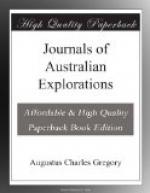4th October.
Started with the dawn, and pushing our tired and hungry horses over the plain as fast as circumstances would admit, arrived at the encampment before the heat of the day became excessive. During our absence two more waterholes had been excavated, and sufficient water obtained for the horses; but, from the great evaporation, it did not seem likely to last longer than three or four days: the hardness of the sandstone precluded our sinking the wells more than one and a half feet. The extreme aridity of the country—the absence of water in consequence of the sandy nature of the soil, which renders it impossible that watercourses should exist—the dense and almost impassable nature of the thickets of acacia and melaleuca of small growth, and the heat of the climate—all tend to prove the fallacy of attempting to explore this part of the colony, excepting during the wettest of the winter months. Under the existing circumstances, I considered it my duty not to lead the party into a position from which it would most probably be impracticable to extricate ourselves without at least losing some of our horses; and even difficulties of a more serious nature might arise, which would prevent the more complete examination of the imperfectly known country to the southward of our present position, more especially as a successful advance to the northward seemed impossible.
5th October.
Left the encampment at 8.10 a.m.; steered north 135 degrees east magnetic over sandy country, covered with coarse scrub; at noon passed a narrow strip of wooded grassy land, the soil being limestone and red loam. The country again became scrubby, and, descending an open valley, came on a small watercourse at 1.5 p.m., trending south; followed it south-south-west. At 2.15 passed our bivouac of the 29th September, and turning south-west along the stream-bed, at 4.0 came on the right bank of the Murchison River, running through wide grassy flats, the stream forming large pools, some of them more than a mile in length; but, with the exception of the flats on each side of the bank, the country is poor and scrubby, destitute of trees, and the hills high and rocky, consisting of red sandstone, those to the west capped with limestone.
6th October.
The horses being much fatigued and nearly starved, having subsisted chiefly on scrub for the last two days, we determined to rest them for a few days, while we examined the river towards its mouth. I started with Mr. Bedart, and tracing the stream downwards to the south-west, reached the sea after a ride of six hours. Excepting the flats and a narrow strip of land on each side, the country was very indifferent, the hills being composed of sandstone and sand, covered with coarse scrub and a gigantic species of grass, the leaves of which, instead of affording food for stock, were a source of great annoyance to our horses, being armed with sharp thorny points, and was somewhat




